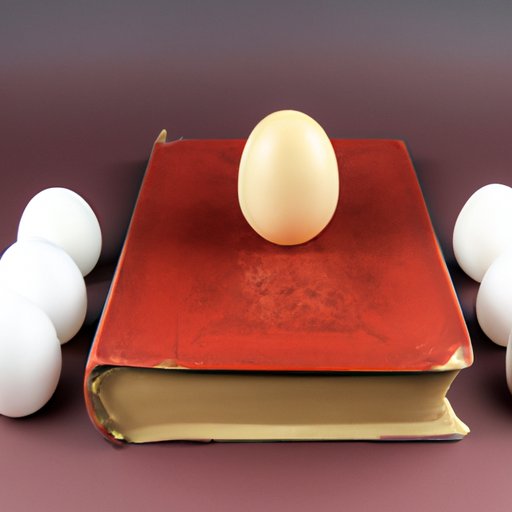
Introduction
Lent is a period of spiritual reflection and renewal in which Christians prepare for the celebration of Easter. This period lasts 40 days and is a time of prayer, penance, and sacrifice. During Lent, the faithful are expected to abstain from certain foods and activities as a form of spiritual discipline. However, it is not always clear what is permitted and what is not, leading to the question: can you eat eggs during Lent? In this article, we will explore the traditions and restrictions of Lenten fasting and attempt to navigate the tricky terrain of egg consumption during Lent.
Exploring the Traditions and Restrictions of Lenten Fasting, Including the Question of Eggs
Lenten fasting has its roots in early Christianity, with its evolution governed primarily by the Catholic Church. The tradition of fasting during Lent grew out of the practice of fasting during the forty days leading up to Easter that was observed in the early Church. Over the years, the rules surrounding Lenten fasting have changed, resulting in different practices across different regions and churches.
Catholics observe strict fasting and abstaining rules during Lent, which are set by the Church. According to the Code of Canon Law of the Latin Catholic Church, all Catholics between the ages of 18 and 59 are expected to fast on Ash Wednesday and Good Friday. This means eating only one full meal, with two smaller meals that, combined, are not equal to a full meal. Additionally, Catholics over the age of 14 are expected to abstain from meat on Ash Wednesday and all Fridays during Lent.
When it comes to eggs, there has been some confusion over the years regarding whether they qualify as meat or not. The Catholic Church considers meat to be flesh from warm-blooded animals, so eggs are technically not considered meat. However, over the years, eggs have been included in the list of foods that are restricted during Lent, leading to debates over whether they can be eaten or not.
Navigating the Tricky Terrain of Lenten Food Restrictions: What’s the Deal With Eggs?
The rules surrounding Lenten fasting can be complex and challenging to understand. The Catholic Church itself has provided guidance on how to approach the issue of eggs during Lent. In 1966, the United States Conference of Catholic Bishops issued a statement clarifying the Church’s stance: “Abstinence laws consider that meat comes only from animals such as chickens, cows, sheep or pigs-all of which live on land. Birds are also considered meat. Abstinence does not include meat juices and liquid foods made from meat.”
Despite this clarification, it can be challenging to know how to approach eggs during Lent. Some Catholics, believing eggs should be abstained, will avoid consuming them during Lent, while others argue that because they are not technically meat, they can still be consumed. This creates different perspectives on whether or not it is permissible for Catholics to eat eggs during Lent.
The Lenten Fast and the Egg Dilemma: Understanding the Church’s Teachings and Historical Practices
The history of the Lenten fast and the role of eggs in it can help us understand the Church’s teachings on egg consumption during Lent better. Early on, eggs were entirely prohibited during the Lenten fast. This was because they were associated with meat and dairy and were considered a luxury item. Over time, however, the Catholic Church gradually allowed the consumption of eggs, albeit with certain restrictions.
Today, the Catholic Church allows the consumption of eggs during Lent under specific conditions. If you are following the traditional observances of Lent, you may eat eggs only during specific times, such as in the morning, and have to follow a certain quantity of eggs allowed in a meal. However, many modern Catholics take a more lenient approach to Lenten fasting and are likely to consume eggs frequently during Lent.
Cracking the Egg Question: How Modern Catholics Can Approach the Lenten Fast and Egg Consumption
When it comes to egg consumption during Lent, modern Catholics have different approaches. Some believe that eggs are not permitted during Lent, while others believe that the current position of the Catholic Church recognizes eggs as a vital source of nutrition. While the Church encourages Catholics to observe the Lenten fast, it also stresses that the rules should not cause anxiety or unease.
Many modern Catholics choose to engage in different forms of fasting during Lent. Some abstain from social media or other sources of distraction, while others avoid television or other forms of entertainment. However, a significant number of modern Catholics do not fast or abstain from foods during Lent.
Eating Eggs During Lent: Debunking Myths and Misconceptions for the Faithful
There are several myths and misconceptions associated with Lenten fasting, and the consumption of eggs specifically. Some individuals believe that the rules regarding the consumption of eggs during Lent are overly complicated and have resulted in considerable confusion and anxiety among the faithful. Others believe that the Church’s teachings on egg consumption are archaic and outdated.
One of the common misconceptions about Lenten fasting is that it is only about abstaining from certain foods. The purpose of fasting during Lent is more than just sacrificing a specific item; it is about developing a deeper spiritual connection and a more significant appreciation for the meaning of Easter.
Conclusion
In conclusion, the question of egg consumption during Lent is complicated and open to interpretation. The Catholic Church allows for the consumption of eggs during the Lenten fast, but there are specific conditions that must be met. However, many modern Catholics do not follow these restrictions, and their interpretation of whether eggs can be consumed during Lent varies. Ultimately, the Lenten fast is a deeply personal experience, and each individual must make their choice regarding how to approach it. Whether you choose to abstain from certain foods or engage in different forms of spiritual sacrifice, the most important thing is to develop a more profound spiritual connection during this time of year.




